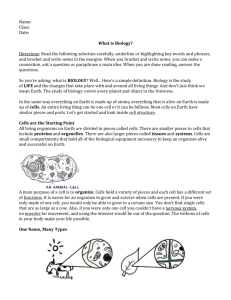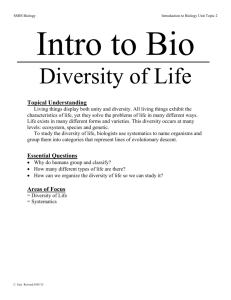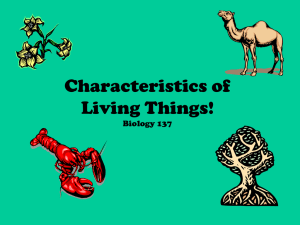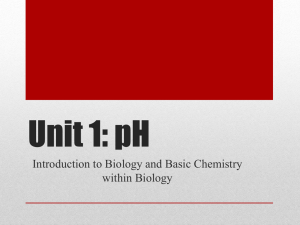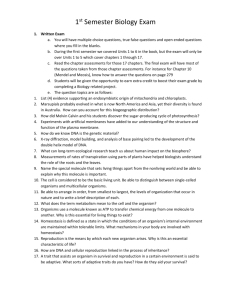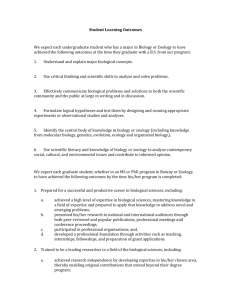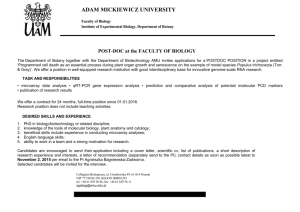Project Description
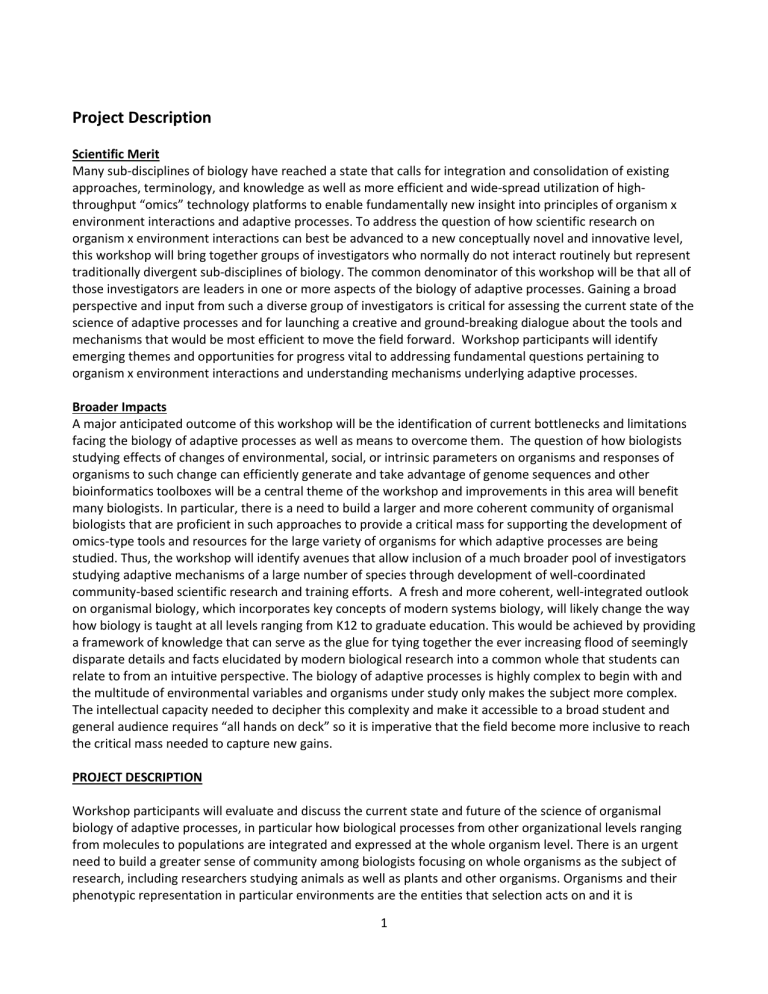
Project Description
Scientific Merit
Many sub-disciplines of biology have reached a state that calls for integration and consolidation of existing approaches, terminology, and knowledge as well as more efficient and wide-spread utilization of highthroughput “omics” technology platforms to enable fundamentally new insight into principles of organism x environment interactions and adaptive processes. To address the question of how scientific research on organism x environment interactions can best be advanced to a new conceptually novel and innovative level, this workshop will bring together groups of investigators who normally do not interact routinely but represent traditionally divergent sub-disciplines of biology. The common denominator of this workshop will be that all of those investigators are leaders in one or more aspects of the biology of adaptive processes. Gaining a broad perspective and input from such a diverse group of investigators is critical for assessing the current state of the science of adaptive processes and for launching a creative and ground-breaking dialogue about the tools and mechanisms that would be most efficient to move the field forward. Workshop participants will identify emerging themes and opportunities for progress vital to addressing fundamental questions pertaining to organism x environment interactions and understanding mechanisms underlying adaptive processes.
Broader Impacts
A major anticipated outcome of this workshop will be the identification of current bottlenecks and limitations facing the biology of adaptive processes as well as means to overcome them. The question of how biologists studying effects of changes of environmental, social, or intrinsic parameters on organisms and responses of organisms to such change can efficiently generate and take advantage of genome sequences and other bioinformatics toolboxes will be a central theme of the workshop and improvements in this area will benefit many biologists. In particular, there is a need to build a larger and more coherent community of organismal biologists that are proficient in such approaches to provide a critical mass for supporting the development of omics-type tools and resources for the large variety of organisms for which adaptive processes are being studied. Thus, the workshop will identify avenues that allow inclusion of a much broader pool of investigators studying adaptive mechanisms of a large number of species through development of well-coordinated community-based scientific research and training efforts. A fresh and more coherent, well-integrated outlook on organismal biology, which incorporates key concepts of modern systems biology, will likely change the way how biology is taught at all levels ranging from K12 to graduate education. This would be achieved by providing a framework of knowledge that can serve as the glue for tying together the ever increasing flood of seemingly disparate details and facts elucidated by modern biological research into a common whole that students can relate to from an intuitive perspective. The biology of adaptive processes is highly complex to begin with and the multitude of environmental variables and organisms under study only makes the subject more complex.
The intellectual capacity needed to decipher this complexity and make it accessible to a broad student and general audience requires “all hands on deck” so it is imperative that the field become more inclusive to reach the critical mass needed to capture new gains.
PROJECT DESCRIPTION
Workshop participants will evaluate and discuss the current state and future of the science of organismal biology of adaptive processes, in particular how biological processes from other organizational levels ranging from molecules to populations are integrated and expressed at the whole organism level. There is an urgent need to build a greater sense of community among biologists focusing on whole organisms as the subject of research, including researchers studying animals as well as plants and other organisms. Organisms and their phenotypic representation in particular environments are the entities that selection acts on and it is
1
imperative to better integrate current scientific efforts at the whole organism level if we are to understand principles of gene x environment interaction, evolution, and environmental effect-response relationships.
Thus, a major theme of this workshop will be to identify avenues through which knowledge generated at molecular, genetic, and cellular levels of organization can be best integrated with whole organism biology. In particular, participants will identify limitations, bottlenecks, and challenges that currently limit the effectiveness of harnessing available omics tools and other toolsets for adaptation biology and develop recommendations for overcoming those. Novel mechanisms for more efficient and broader training at all levels of education ranging from K12 to postdoctoral and faculty training will be explored and discussed. In addition, recommendations for avenues allowing development of a greater sense of community among researchers that study how organisms adapt to / cope with changing internal and external environments will be developed in this workshop. Participants will discuss what they view as the most promising opportunities for accelerating progress in the biology of adaptive processes and mechanisms for advancing this field. Any focal points in this regard for which a broad consensus emerges will be identified and developed during the workshop. One point of emphasis will be the question of how best to harness the power of emerging highthroughput phenomics / molecular phenotyping and bioinformatics / computational approaches in future efforts to gain greater insight into major biological questions. Intellectual progress on these issues will require discussion among groups of investigators who normally do not interact or communicate, but have a deep understanding of/ represent various sub-disciplines of adaptive processes ranging from ecophysiology, molecular biology, genomics/bioinformatics, quantitative genetics, organismal biology to evolutionary biology.
Thus, workshop participants will bring in unique viewpoints and experience but also have much common scientific interest on which to base a creative and ground-breaking discussion.
Intellectual Merit: Specific Objectives
Specific objectives are:
To identify common fundamental challenges limiting our understanding of how organisms interact with their environments, and to develop ideas about how to surmount those challenges.
To improve understanding of how genes produce organisms adapted to individual needs and experience.
This includes organism structure and function, acclimation, adaptation sensu stricto, and evolution.
To bring together researchers who do not interact routinely on these issues as a means to lower intellectual barriers to progress.
To identify the most promising and effective avenues for building a greater sense of community among investigators studying how organisms respond to change at multiple levels of biological organization.
To discuss mechanisms that would allow more efficient harnessing of “omics”, bioinformatics, and other data-intensive technologies by biologists that are focusing on fundamental questions of the biology of adaptive processes.
To identify opportunities for advancing our theoretical understanding and intellectual base to a point that allows the design of better, more powerful, more holistic, and more integrative approaches such as systems biology approaches.
To identify mechanisms that would allow beginning and mid-career investigators seeking to develop their research programs to more effectively take advantage of existing know-how and state-of-the art technologies for studying how organisms adapt to / cope with changes of environmental, social, or intrinsic parameters.
2
The focus of this workshop will span multiple levels of biological organization, from the molecular (genes, transcripts, proteins, metabolites) through the morphological and physiological (cells and tissues) to the whole organism and its population and environmental contexts. These systems must be configured to allow specific changes to occur while preserving phenotypic integrity. How does this happen and what are critical constraints in this regard? Rapid progress has been made in introducing technology platforms for defining genotypes and phenotypes at each of these levels, i.e. high throughput genomics, transcriptomics, proteomics, metabolomics, and epigenetics. Nonetheless, implementing these platforms for research focusing on how whole organisms respond to changes of environmental, social, or intrinsic parameters, while preserving integrated organismal function, and integrating these different levels is just beginning to be explored. Techniques focused on organism function such as high-resolution cellular imaging and physiology; computer-based behavioral analyses; quantitative methods for modeling complex systems that generate important organismal insights allow us to define and investigate important questions. However, the dynamic aspects of these systems and how they are controlled by genetic / epigenetic, and posttranslational networks must also be considered.
These dynamic systems, which show non-linear responses to changes of environmental, social, or intrinsic parameters, represent a particularly complex problem and emphasize the need for integration with cyberinfrastructure including bioinformatics and advances in mathematical modeling. Thus, this workshop will particularly address the following questions:
How can we best build a sense of community among researchers focusing on the scientific questions outlined above? A sense of community must derive from a sense of shared purpose and common overall goals as well as shared resources, data, knowledge, training, and expertise. How can those needs be best addressed?
What are the most pertinent over-arching questions defining the biology of adaptive processes that are being tackled or need to be tackled by the various sub-disciplines of biology? What are common themes and emerging topics in that regard?
What are the most effective ways for maximizing the training of biologists focusing on mechanisms of adaptive processes in and their use of technology-intensive approaches such as the various omics technologies. etc?
How can we best coordinate community building efforts to fuel ground-breaking future innovations in adaptation biology at an international level?
What are anticipated future developments in this field and what are strategic core issues? Where do we envision this science to be in 5 – 10 years? What do we need to get there?
Statement of Need
On an evolutionary timescale, organisms cope with changes of environmental, social, or intrinsic parameters through the accumulation of favorable genotypes across generations. On the timescale of an individual life, plastic responses constantly adjust behavior, physiology and morphology to changing environmental and social circumstances. An urgent need in the context of global change, including climate shifts, human disturbance and invasive species, is gaining an understanding of integrated organismal responses to changes of environmental, social, or intrinsic parameters on these very different time scales, from genotypes to phenotypes, including consideration of evolutionary, epigenetic, and physiological mechanisms. It is important to devise and implement plans to enable investigators to develop tools for emerging or new model systems that are most appropriate for addressing these critical and pressing questions in biology. Flexibility is critical for taking full advantage of new discoveries that may lead to utilization of additional important models.
Although research in organismal biology is fundamental for unraveling life’s complexity in a changing world, without examining the central issues of how organisms deal with predictable changes of the abiotic and biotic,
3
including social, environments, and how they also must cope with perturbations and the potential for stress, organismal biology as a field will suffer. The field of organismal biology is combining the diverse facets of reductionist research but faces a need to better integrate reductionism with complementary discovery-driven approaches.
but it faces the possibility of repeating the mistakes of the reductionist tradition if it does not take into account the whole picture. Taking into account the whole picture means including the interaction of organisms with their environment and how they respond to or cope with changing environmental, social, or intrinsic parameters. Unless this significant variable is part of the integration process, current work to create an integrated organismal biology will face the same shortcomings and limitations of reductionist biology.
The evolution of mechanisms through which organisms interact with each other and the environment at all scales from the molecular to developmental, physiological, morphological, behavioral, and societal processes in ecological contexts is widely recognized as a frontier that must now be explored with greater emphasis.
Better incorporation of the environment as a significant variable shaping organismal biology is necessary for moving the field forward.
Listing of Recent Meetings on the Subject
Phenomes- Beyond Genomes.
March 31- April 2, 2011, St Louis, Missouri
The workshop was co-sponsored by NSF-MCB and USDA-NIFA. The workshop’s intent was to identify grand challenges faced by the research community in furthering our understanding of the genetic underpinnings of phenotype in a post-genomics world. This workshop arose out of discussions among program staff and leadership of the NSF, NIFA and DOE aimed at identifying scientific challenges and funding areas.
Organizing Committee
Gene Robinson, University of Illinois; David Clayton, University of Illinois; Dietmar Kültz, Univeristy of
California – Davis.
The organizing committee will work with an administrative assistant (Tish Cundiff, University of Illinois) to organize all aspects of this workshop. The PI (Kültz) will coordinate speaker invitation, reimbursement, and cochair the workshop, one of the Co-PI’s (Robinson) will chair the workshop and coordinate the venue, and the other Co-PI (Clayton) will oversee and lead the preparation of a report in form of a white paper or publication and co-chair the workshop.
Location and Dates
September 19-20, Hilton Hotel, Arlington
Backup dates: TBD if necessary based on participant availability.
Participant Invitation Process
This workshop will include a diverse group of scientists representing different biological sub disciplines that have in common that they focus on interactions of organisms with external and internal environments. Great care was used in identifying participants in terms of rank, subjects of expertise, from broad geographic areas and a range of institution types, and degree of representation in biology. The participant selection was driven by a desire to be inclusive and to encourage diverse groups, including those that are underrepresented in biology to participate and provide input and feedback during discussions.
Conceptual and Organizational Framework for Meeting
4
In addition to the scientific issues outlined previously, the following general topics and concepts will form the framework for discussion at the workshop, within the context of what we currently perceive to be the foundations for integrated organismal biology:
How do we build a sense of community?
There is an urgent need to build a sense of community on a broad front and one goal of this workshop is to identify the most effective ways to address this need. Possibilities for catalyzing modern research on organismal adaptive processes / systems biology through the use of shared resources and training mechanisms will be explored and recommendations of possible community-building mechanisms will be developed based on the outcome of the workshop discussions.
How do we build future opportunity and capacity by coordination of sequencing, bioinformatics and organismal biology questions?
With sequencing efficiency and throughput increasing, and costs steadily declining, investigators are already planning to sequence the genomes of many organisms. The information from these efforts will be of great value to organismal biologists asking fundamental questions. Coordination of efforts to make best use of the sequences and to generate knowledge from the raw data by bioinformatics analyses will be a challenge. How will the community work to take advantage of this opportunity?
What is the future of this new age of integration?
Workshop participants will discuss the future of the science. If presented with the proposition that they will have support for the genomic/bioinformatics work, and support for capacity building so that more organismal biologists are capable of operating at a higher level in these areas, where will this science be 5-10 years out?
How will the initiatives from the workshop enable this and what is the level of effort required to make the best use of the results of these initiatives?
Education and training from genomes to organisms: investment by whom?
The workshop will involve conversations about the challenges of these efforts, and opportunities that derive from newer technologies and analysis tools as a means to inform and develop the broader community.
Participants will consider ways to build capacity in “omics” technologies and analysis, and how best to coordinate these efforts across multiple genomes and the accompanying bioinformatics analyses. How will the training of younger investigators, as well as mid-career PIs, be enabled so that the whole community can take their research to the highest level.
Broader Impacts
The workshop will provide an assessment of the current state of knowledge integration across the field of organismal biology focusing on adaptive processes, allowing us to identify the gaps and opportunities in the research that need to be addressed, the resources available to address them, and to propose the prioritization for allocating resources across outstanding areas of inquiry. What are to be the building blocks on which we will build an integrated approach to organismal biology of adaptive processes that incorporates a changing world? What elements need to be put in place first and what is the critical path to our destination, as best we can surmise it? How can we more effectively incorporate novel integrative approaches and strategies of providing knowledge to all levels of students ranging from K12 to graduate and in ways that will revolutionize biology textbooks? In addition to addressing these key questions, the participants will determine how the large scientific community targeted by this workshop can: 1. best take advantage of the data from new whole genome sequencing projects, and how they will build the capacity to do so; 2. build on the experience of researchers who have led earlier whole genome sequencing projects; and, 3. train current, new investigators, in addition to the next generation of scientists, in the field so they are prepared to meet the demands of this new interdisciplinary, environmental systems biology approach to integrated organismal biology. Finally, it is
5
important that an outcome of the workshop be a white paper and/or commentary in a highest profile journal such as Science or Nature.
Agenda:
To be efficient and outcome-oriented the goals of the workshop as broadly defined above will be addressed as follows: Participants will prepare themselves prior to arrival for discussing their viewpoints, insights, opinions, ideas and experiences regarding the topics and questions stated in the agenda for day 1 below. We would like to achieve a broadly based discussion of these topics to be able to draw on the wealth of unique expertise represented by leaders from diverse sub-disciplines that are associated in diverse ways with the biology of adaptive processes. Based on this wealth of expertise exchanged, discussed, and assessed on day 1 we will then, as a group on day 2, distill and compile the major themes and recommendations for facilitating advancement of scientific research on the biology of adaptive processes and mechanisms of organisms x environment interactions. These conclusions and recommendations will be collectively summarized in form of a white paper to distribute our ideas and opinions for raising the efficiency, innovation, conceptual novelty, and transformative implications of scientific activity in this central field of biology to a new level.
Participants will arrive on Sunday afternoon. The scientific program will begin at 8 am on Monday.
Day 0 (Sunday, Sep 18)
Afternoon / Evening - Arrival of participants and check-in to Hilton Hotel
Day 1 (Monday, Sep 19)
8:00 – Welcome address (Dietmar Kültz)
8:15 - Opening remarks from NSF perspective - John Wingfield (Director, IOS, NSF)
8:30 – 9:30 – Sub-disciplinary break out groups
The charge for these groups is to discuss how specific sub-disciplines of biology, each of which is represented by multiple leaders, can most effectively contribute to advancing our understanding and knowledge of fundamental principles and mechanisms of organismal adaption to external and internal environments. All workshop participants will prepare notes, examples, and well thought-out opinions on the current state, bottlenecks, opportunities, and anticipated major developments over the next 10 years in their area of expertise prior to the workshop to enable productive discussion of opportunities and needs for advancing our knowledge on how complex organisms adapt to changes in the environment to a higher level. The emphasis should be on opportunities and challenges for inclusion of a wide variety of complex organisms (not only traditional, established model organisms) in the future. Topics that should be discussed during these break-out sessions may differ depending on the specific sub-disciplines. However, overarching topics that should be addressed include the following: What are the main intellectual and / or tangible drivers for studying adaptive processes of organisms and how do these drivers impact progress in your sub-discipline? What are the major bottlenecks and challenges that prevent more rapid progress in studying principles and mechanisms underlying adaptive processes of organisms in your sub-discipline given a reasonably realistic assessment of available resources? What are the most promising opportunities in your sub-discipline to advance our understanding of organism x environment interactions (from both intellectual and tangible perspectives)?
What mechanisms of training, collaboration, and infrastructure organization are most efficient for fostering scientific discoveries, community-building, and public awareness/ support of investigating the biology of adaptive processes in complex organisms? What are the strategic core issues that need to be tackled with high priority to significantly advance our knowledge of mechanisms and principles underlying organism x environment interactions and adaptive processes within the next 10 years?
Break-out groups
6
1.
Bioinformatics, Cyber-infrastructure, Genome-scale modeling, Shared Resources
(Dan Stanzione, Lou Gross, Rasmus Nielsen, Ken Dewar,)
2.
Developmental Biology
(Alexander Shingleton, Craig Albertson)
3.
Comparative Ecophysiology / Evolutionary Physiology
(Ann Todgham, Joel Kingsolver, Hannah Carey, Dietmar Kültz)
4.
Sociogenomics / Behavior
(Molly Cummings, Scott Edwards, Marla Sokolowski, Gene Robinson)
5.
Neuroendocrine mechanisms, neural networks
(Hans Hoffmann, Michael Meany, Barney Schlinger, David Clayton)
10:30 – 10:50 - Coffee break
10:50 – 12:00 – Groups report back to all participants (10 min summary per break-out group)
Each break-out group determines one member who will present the results of discussion in their break-out group to all participants in form of a 10 min summary. These summaries will represent draft material for the first part of the whitepaper. This first part of the whitepaper will focus on a general assessment of potential opportunities, bottlenecks, and projected developments in core areas of biology to enable identification (in the afternoon break-out sessions) of the most promising prospects for interdisciplinary cross-fertilization and strategic investment to advance our knowledge on how complex organisms adapt to the environment.
12:00 – 13:00 – Lunch break
13:00 – 14:45 – Interdisciplinary breakout groups
The discussions taking place in this session represent the central focus of the workshop. Informed by the reports of the morning session groups the interdisciplinary break-out groups will identify the most promising prospects for interdisciplinary cross-fertilization and strategic investment to advance our knowledge on how complex organisms adapt to the environment. These groups are all charged with the same overall task but may develop and/or emphasize different themes emerging from the morning session, which will then be consolidated and discussed by the entire group of participants at the end of day 1 and on day 2. Ideas on the best and most effective avenues of interaction between diverse sub-discipline of biology that are concerned with the study of organismal adaptations to environmental changes will be developed. Additional topics that will be addressed during this breakout session include the following: Are the challenges we face similar across diverse sub-disciplines? Are solutions for overcoming specific problems that have already been successfully implemented for one sub-discipline applicable to other fields as well? How can existing approaches for studying adaptive processes of organisms be most effectively integrated and consolidated across diverse subdisciplines to fuel new concepts, innovation, and transformative science in this area? How can high-throughput
“omics” technology platforms and other emerging, technically demanding approaches be more rapidly and effectively utilized to enable fundamentally new insight into principles of organism x environment interactions and adaptive processes in complex organisms? What infrastructure and resources are necessary to advance research on organism x environment interactions and the biology of adaptive processes to a higher conceptually novel and innovative level?
Break-out groups
1.
Cross-disciplinary breakout group 1
(Dan Stanzione, Craig Albertson, Ann Todgham, Molly Cummings, Hans Hoffmann)
2.
Cross-disciplinary breakout group 2
(Lou Gross, Alexander Shingleton, Joel Kingsolver, David Clayton)
7
3.
Cross-disciplinary breakout group 3
(Rasmus Nielsen, Hannah Carey, Gene Robinson, Michael Meany)
4.
Cross-disciplinary breakout group 4
(Scott Edwards, Ken Dewar, Marla Sokolowski, Barney Schlinger, Dietmar Kültz)
13:45 – 14:00 coffee break
Continue with Break-out groups
14:45 – 15:45 – Groups report back to all participants (15 min summary per break-out group)
Each break-out group determines one member who will present the results of discussion in their break-out group to all participants in form of a 15 min summary. These summaries will represent draft material for the second part of the whitepaper. This second part of the whitepaper will focus on the identification of the most promising prospects for interdisciplinary cross-fertilization and strategic investment to advance our knowledge on how complex organisms adapt to the environment. This aspect will be informed by the reports generated during the preceding morning session and represents a prerequisite for developing specific recommendations for an implementation plan on the next day. The reports will identify opportunities for cross-disciplinary interaction to 1) overcome the most pressing bottlenecks and challenges identified in the morning session reports, 2) increase efficiency and productivity of comparative research on adaptive processes of a diverse array of complex organisms, 3) increase cross-disciplinary training and community building in the area of comparative organismal biology with emphasis on better understanding mechanisms and principles of adaptive processes and organism-environment interactions, 4) increase access to and efficient utilization of high-throughput functional genomics, systems biology, and other emerging technologies and approaches.
15:45-16:00 - Coffee Break
16:00 – 17:00 Whole-group discussion to consolidate the findings reported by the afternoon groups into common themes and to identify foci/ refine topics for discussion of implementation priorities on the next day.
Discussion of emerging ideas that arose during the course of the day; modifications, if needed, for the next day agenda.
19:00 – 21:00 Workshop group dinner
Day 2
8:00 - 9:30 Whole-group session: Recap and synthesis of previous days discussion and main conclusions;
Assignment of key concepts and topics for discussion of implementation priorities as well as any additional issues that emerged from previous day to break-out groups and determination of most appropriate composition of break-out groups (based on the nature of implementation priorities identified).
9:30 – 9:45 - coffee break
9:45 – 11:15 Break-out groups addressing distinct sets of implementation priorities (or, alternatively, wholegroup discussion).
These groups will each address a different set of implementation priorities and develop specific recommendations for achieving implementation of the opportunities for cross-disciplinary interactions identified on day 1 to foster generation of a new level of knowledge in the area of organismal adaptation and organism x environment interactions for a broad array of species. Recommendations will take into account considerations such as the following: What are the most effective ways for fostering interdisciplinary approaches and intellectual as well as technological cross-fertilization? How can we establish / promote community-building and training efforts / programs to advance the priorities identified on day 1? How can different sub-disciplines concerned in different ways with organismal adaptation to the environment be most
8
efficiently integrated to allow advancement of knowledge and teaching in adaptation biology to a new level?
What is the best game plan for going forward in implementing the priorities identified? How can the strategic core issues that need to be tackled with high priority to advance our knowledge of mechanisms and principles underlying organism x environment interactions and adaptive processes be implemented most efficiently?
How can existing approaches for studying adaptive processes of organisms be most effectively integrated and consolidated across diverse sub-disciplines to fuel new concepts, innovation, and transformative science in this area? How can high-throughput “omics” technology platforms and other emerging, technically demanding approaches be more rapidly and effectively utilized to address priorities identified and enable fundamentally new insight into principles of organism x environment interactions and adaptive processes in complex organisms? What infrastructure and resources are necessary to implement key priorities? What mechanisms of training and collaboration are most efficient for fostering scientific discoveries, community-building, and public awareness/ support of investigating the biology of adaptive processes in complex organisms?
11:15 – 11:30 – Coffee break
11:30 – 13:00 General discussion and synthesis of ideas and suggestions. Integration of any new issues that have emerged from discussion into the overall conclusions. The results of this group discussion will be incorporated as the third part into the whitepaper to suggest possible mechanisms for implementing strategic core issues identified in the workshop. Organization of a plan for writing a report document including conclusions and recommendations. Groups assigned to summarize and write portions of agreement document.
13:00 - 14:00 Lunch
14:00 - 16:00 Writing in groups based on drafts generated from reports on days 1 and 2
16:00 - 17:00 Reconvene as a whole, identify holes that emerged while writing that need to be filled. Plan for completion of report and co-authorship.
17:00 End of workshop
Participants
The workshop will include key researchers from multiple fields of organismal biology focusing on adaptive processes that represent the scope of interests in the biology directorate. Individuals who have agreed to participate are listed in the table below. Tentative attendees are highlighted in yellow.
Discipline
Bioinformatics,
Cyberinfrastructure,
Genome-scale modeling
Bioinformatics,
Cyberinfrastructure,
Genome-scale modeling
Bioinformatics,
Cyberinfrastructure,
Genome-scale modeling
Name
Dan
Stanzione
Lou Gross
Institution iPlant
NIMBioS
Ken Dewar McGill
University
Specialty Area
Cyberinfrastructure and network modeling
Director, NIMBios; Math-
Bio Interface
Large scale sequencing and analysis, comparative genomics
Web Page address http://www.iplantcollaborative.org/ about/people http://www.nimbios.org/personnel/ gross http://gchelpdesk.ualberta.ca/bioi nfo_directory/Details.php?id=277
6
9
Bioinformatics,
Cyberinfrastructure,
Genome-scale modeling modeling
Developmental biology
Rasmus
Nielsen
University of
California -
Berkeley statistical and computational aspects of evolutionary theory and genetics http://ib.berkeley.edu/research/int erests/research_profile.php?pers
on=391
Developmental biology
Ecophysiology /
Evolutionary physiology
Ecophysiology /
Evolutionary physiology
Alexander
Shingleton
Craig
Albertson
Michigan
State Univ.
Syracuse
Dietmar Kültz UC Davis
Hannah
Carey
Joel
Kingsolver
Univ.
Wisconsin
UNC
Chapel Hill
Evo-Devo, developmental genetics and evolution of allometries, Drosophila
Evo-Devo of craniodental morphology in cichlids and zebrafish
Ecophysiology of fishes,
Evolution of euryhalinity, proteomics of env. stress responses comparative gastrointestinal physiology, hibernation biology of mammals evolutionary and physiological ecology https://www.su.edu/~shingle9/ind ex.html http://albertsonlab.syr.edu/resear ch.html http://kueltzlab.ucdavis.edu/ http://www.vetmed.wisc.edu/peop le/careyh/ http://www.bio.unc.edu/faculty/kin gsolver/
Ecophysiology /
Evolutionary physiology
Ecophysiology /
Evolutionary physiology
Sociogenomics, behavior
Ann
Todgham
Gene
Robinson
Sociogenomics, behavior
Sociogenomics, behavior
Molly
Cummings
Hans
Hoffmann
Sociogenomics, behavior
Marla
Sokolowski
Sociogenomics, behavior
Neuroendocrine mechanisms, neural networks
Scott
Edwards
David
Clayton
Neuroendocrine mechanisms, neural networks
Michael
Meaney
Neuroendocrine mechanisms, neural networks
Barney
Schlinger
SF State
Univ.
Univ.
Illinois
Iowa State fish sociality and genomics
UT Austin molecular and hormonal mechanisms of social
Univ.
Toronto
Harvard behavior, evolution of cichlid fish behavioral genetics of insects, evolutionary and molecular neurophysiology of flies
Avian diversity, evolution, behavior
Univ.
Illinois acid-base regulation of seastars and other marine invertebrates
Sociality, honey bee behavior and genetics, genomics
McGill
University
Song bird models of genetic underpinnings of brain function and behavior brain development in response to stress, neuroendocrine mechanisms in mammals
UCLA effects of steroid hormones on behavior and neural function, avian neuroethology and neuroendocrinology http://biology.sfsu.edu/people/ann e-todgham-0 http://www.life.illinois.edu/robinso n http://www.biosci.utexas.edu/ib/fa culty/cummings.htm
http://www.biosci.utexas.edu/ib/fa culty/hofmann.htm
http://www.utm.utoronto.ca/~w3fo rage/ http://www.oeb.harvard.edu/facult y/edwards/ http://www.life.illinois.edu/clayton/
Home.html
http://neurology.mcgill.ca/meaney
_m.html
http://www.ibp.ucla.edu/research/ schlinger/barney_profile.html
10
